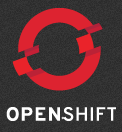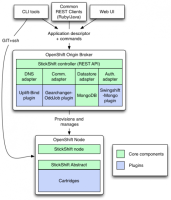Red Hat open sources OpenShift

As previously announced, Red Hat has open sourced its OpenShift Platform-as-a-Service (PaaS) offering. The community version of the product, which has been named OpenShift Origin, can be downloaded as a Fedora-based live CD that may be used to set up an OpenShift instance on a spare machine or using VirtualBox.
OpenShift was announced a little less than a year ago and is based on technology from Makara, a company Red Hat acquired in 2010. The platform uses several open source applications in the background and with today's announcement, Red Hat has open sourced the user interface and the components that tie everything together. The OpenShift software stack is written in Ruby and uses YAML to define the containers for applications hosted on the platform.

![]() Components of OpenShift
Components of OpenShift
Source: Red Hat
There are several different editions of OpenShift that range from the Express version which runs applications written in PHP, Ruby and Python to the Flex edition which runs more complicated Java and PHP applications and ties into Red Hat's JBoss middleware product. The top level OpenShift Power offering can run any application that compiles on Red Hat Enterprise Linux (RHEL) 4 or above. OpenShift then has options to tie these applications into several databases, such as MySQL, PostgreSQL and MongoDB. To deploy on the platform, developers use Git to push their code up to the cloud and OpenShift will handle scaling and management behind the scenes.
Red Hat has stated that it plans to develop OpenShift in a similar way to the Fedora Linux distribution, with OpenShift Origin being the upstream project to its own commercial product. In this vein, the company is providing bug tracking facilities, project hosting and other support to the OpenShift community, just as it does for Fedora.
OpenShift Origin is licensed under the Apache 2 Licence and the code for the project is available on GitHub. The software can be installed on its own or on top of the OpenStack framework, which Red Hat has been backing prominently in recent months.
(fab)
![Kernel Log: Coming in 3.10 (Part 3) [--] Infrastructure](/imgs/43/1/0/4/2/6/7/2/comingin310_4_kicker-4977194bfb0de0d7.png)

![Kernel Log: Coming in 3.10 (Part 3) [--] Infrastructure](/imgs/43/1/0/4/2/3/2/3/comingin310_3_kicker-151cd7b9e9660f05.png)
















